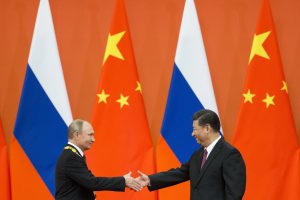Russia’s February 2022 invasion of Ukraine, and the ongoing war, has had far-reaching economic and political consequences. In Asia, Russia’s relationships with China and India have been challenged by the invasion; ties with Beijing, however, have also been augmented through a shared anti-American position. In Central Asia, the war in Ukraine has been met with measured neutrality even as Russia’s ability to provide security in the region has been diminished and China has pursued regional transport projects that circumvent Russia.
A decade ago, Russia – much like the United States – iterated a “pivot to Asia.” Russia’s effort to diversify relations across Asia have not necessarily met with much success.
To discuss these aspects of Russia’s relations in Asia and more, The Diplomat’s Catherine Putz spoke with Dr. Natasha Kuhrt, a senior lecturer in international peace and security in the Department of War Studies at King’s College London.
There’s been a lot of discussion of how China views Russia, but how does Russia view China? Is Moscow happy with the level of support it has gotten from Beijing?
At the official level, the narrative in Russia is that relations are better than ever. Public opinion polls show ordinary Russians also feel similarly – a poll cited by the Russian International Affairs Council (RIAC) in an August 2022 report noted that over 91 percent of Russian respondents and 98 percent of Chinese respondents feel that bilateral relations will grow even deeper; 72.6 percent of Russians and 87 percent of Chinese believe that the two countries should work to strengthen comprehensive strategic cooperation.
In the economic sphere, at first glance trade looks to have increased, but this is mainly due to the rise in prices of oil and gas. China has taken full advantage of cheap Russian oil. There has also been discussion of Russia moving to the Chinese yuan as a reserve currency. However, there has been intense debate within the Russian government regarding the wisdom of such a move. A particular issue is the fact that the yuan is not fully convertible and the rate is controlled by Beijing, raising concerns that Russia could become a victim of Chinese manipulation.
While President Putin has expressed his gratitude to China for its support, other commentary hints at a more selfish Chinese attitude. For example, Andrei Kortunov, director of RIAC, suggests that “it would be hardly fair to define Beijing’s foreign policy as ‘pro-’ or ‘anti-Russian,’ since they have always been and will primarily be ‘pro-Chinese.’”
Indeed, the war in Ukraine has brought Chinese investment to a standstill, although it should be noted that China has always been a reluctant investor in Russia.
Russia needs Chinese technology – in particular the technology that it previously obtained from the West. China now supplies around a third of Russia’s semiconductors, but increasingly the reliability of this technology is in doubt – around 40 percent of semiconductors imported by Russia since March 2022 from China were defective, as opposed to around 2 percent of imports before the war.
The 20th CCP Congress in October was viewed in Russia as highlighting a welcome continuity in Chinese domestic and foreign policy and the symbolism of authoritarian regime solidarity. Growing Chinese nationalist rhetoric, which could potentially seem dangerous to Russia, is actually welcomed by Russia as it goes hand in hand with increased anti-hegemonism (code for anti-Americanism) and thus Russian and Chinese agendas appear to be increasingly converging.

































